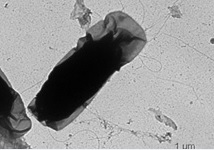
A&M-Texarkana professor’s paper accepted by Journal of Integrated Omics
TEXARKANA, Texas – Texas A&M University-Texarkana professor Dr. Oscar Alzate publishes an article on the proteomic analysis of a typical soil bacterium.
The Journal of Integrated Omics published a quantitative proteomic analysis of the Bacillus thuringiensis BGSC-4AW1 strain (serovar andalousiensis). Dr. Oscar Alzate, Texas A&M-Texarkana Associate Professor of Biotechnology, co-wrote the article. Other collaborators were Mrs. Jessica LeFors, adjunct instructor of Biology at A&M-Texarkana and investigators from the University of North Carolina at Chapel Hill. Dr. Alzate was the principal investigator.
Dr. Alzate explains, “Proteomics is a recent tool of scientific investigation in which they can identify, characterize, and classify the thousands upon thousands of proteins in an organism, according to their structures and functions. Proteomics is a tremendous tool for the analysis of living organisms and applications to medical research.”
He further explains, “Bacillus thuringiensis is a common soil bacterium, found in almost all climates. They have used this bacterium for more than 60 years as the best source for biotechnological applications including biopesticides, and environmental cleansing. Bacillus thuringiensis is widely used for insect control and bioremediation because during some developmental stages this organism makes crystals containing functional proteins.”
“In the present work, proteomics has been utilized to understand the protein contents of a specific strain of Bacillus thuringiensis. This strain, selected after careful review of the old literature, suggested that its proteome might contain essential toxins with applications to insect control, biotechnology, and medicine.
In this collaboration, they found that this Bacillus thuringiensis strain, known as BGSC-4AW1, contains several hundreds of functional proteins. Specifically, they found that the crystals include two critical proteins: one protein with insecticidal capacity, known as Cry8Ca, and another protein that has been demonstrated by Dr. Alzate’s group to destroy cancer cells in cultures.”
For more information, contact Dr. Oscar Alzate at oscar.alzate@tamut.edu or (903) 334-6703.








 EastTexasRadio.com Powered by Ten Stations
EastTexasRadio.com Powered by Ten Stations




